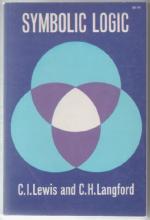|
This section contains 3,220 words (approx. 11 pages at 300 words per page) |

|
Clarence Irving Lewis, the American epistemologist, logician, and moral philosopher, was born in Stoneham, Massachusetts, and educated at Harvard University (AB, 1906; PhD, 1910). He taught at the University of California from 1911 to 1920 and at Harvard from 1920 until his retirement in 1953; after 1930 he was the Edward Pierce professor of philosophy. He delivered the Carus Lectures in 1945 and the Woodbridge Lectures in 1954.
Lewis was a student and critic of modern extensional systems of logic and developed a modal logic based on the notion of strict implication. In epistemology and ethics, he was a pragmatic Kantian.
Lewis internalized within himself the great dialogue on knowledge and reality which began with René Descartes and continued with the British empiricists, Immanuel Kant and the German idealists, and the American pragmatists. It may be said that this tortuous development, both in its long history and in the intellectual life...
|
This section contains 3,220 words (approx. 11 pages at 300 words per page) |

|


